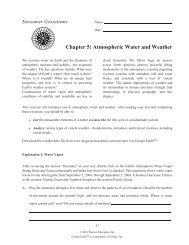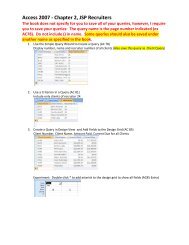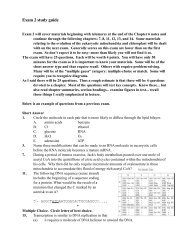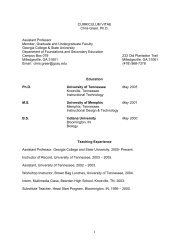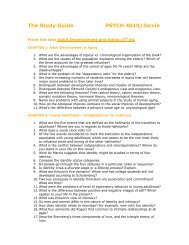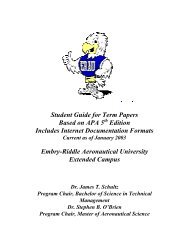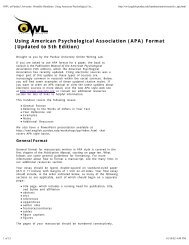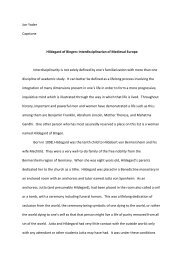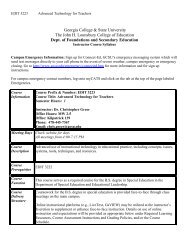media and to interest groups; answering letters and telephone calls from citizens complainingabout such things as taxes being too high or school teachers salaries being too low, andsomehow voting in the state legislature after balancing the views of interest groups, theconcerns of constituents (when those concerns can in fact be determined), the pressures offellow legislators and the governor, and the legislator’s own personal opinions. Obviously, itis very difficult for a legislator to perform such services while trying to fulfill the otherfunctions as well. Yet carrying out such constituent services is a necessity if a legislatorwants to be re-elected every two years. (There have been attempts to increase the term tofour years, but voters have rejected this proposed amendment to the constitution several timesover the past two decades.)What sort of person would not only do this job but actually seek it with some degreeof enthusiasm? First, most state legislators are part-time politicians who are employed fulltimein other fields; the pay of a state legislator in Georgia (about $16,000 per year plusexpenses) is generally not sufficient as the sole source of income. The typical legislator is awhite male (after the 2006 election, just under 20 percent of Georgia's 236 legislators werefemale and about 22 percent were African-American); a lawyer, businessperson, or farmer(29 attorneys, 8 business owners, 34 businesspersons, 6 farmers, 11 insurance related, 4pharmacist, 3 teachers, 1 pastor); and a college graduate (in 2000, about 75% of thelegislators had graduated from college.) In terms of social characteristics, Georgia'slegislators do not strongly resemble the overall population of the state. Is this bad? Shouldmore legislators be female, or black, or from other occupations? Political scientists havemixed views; most would argue that legislators should be roughly representative of theirconstituents (at least in attitudes if not in gender, race, etc.,) but they also add that very fewpolitical systems have ever had a perfect match between the social characteristics ofgovernmental officials and of the public.Historically, the typical member of the Georgia General Assembly was a Democrat.Like the governorship, Democrats controlled both chambers of the legislative branch fromReconstruction until 2002. As Table 3 demonstrates, Republicans have made tremendousgains in recent years. After the 2002 elections, the state Senate became majority Republicanfor the first time since the 1870s. The outcome of the 2004 elections gave Republicanscontrol of both houses of the General Assembly as the GOP picked up 27 House seats andwon three additional seats in the Senate. With the start of the 2007 legislative session,Republicans are in control of the General Assembly, the Lt. Governor’s office and thegovernorship and are well positioned to accomplish a policy agenda.TABLE 3: Partisan Change in the General AssemblySenate (56 total)2001-03 2003-05 2005-07 2007-09Democrats 34 26 23 22Republicans 22 30 33 34------------------------------------------------------------------------------------------------------------------------------------------------------------------------------------------------------------------------------------------------House (180 total)Democrats 103 108 81 74Republicans 77 72 99 106------------------------------------------------------------------------------------------------------------------------------------------------------------------------------------------------------------------------------------------------% Republican 42% 43% 56% 59%of total members12
Georgia's General Assembly is bicameral--having two chambers--as are the nationalCongress and all other state legislatures except Nebraska's. A common question is why is itnecessary to have two legislative chambers. Wouldn't one be enough? The customary answer,at the national level anyway, is that bicameralism allows for two different types ofrepresentation and thus two different perspectives, one based on political or geographic units(e.g., the states in the U.S. Senate), and the second based on people or population (e.g., thecongressional districts in the U.S. House of Representatives). Until the 1960s, many statelegislatures, including Georgia's, were based on this logic, with their upper chambersrepresenting counties and their lower chambers representing people. The U.S. SupremeCourt, however, declared such arrangements at the state level to be unconstitutional. Now inall state legislatures the basis of representation in both chambers is population: within eachchamber, all districts (i.e., the areas from which legislators are elected) must have equalpopulations ("one-man, one-vote," in the words of the Court). Accordingly, after each censusthe district lines must be re-drawn in order to reflect population growth and decline.If the customary answer is no longer valid, then why do we continue to havebicameral legislatures? Probably the best reason for bicameralism is that by having every billpass through two separate houses each chamber can serve as a check on the other, meaningbills can be examined more carefully, mistakes avoided, and hasty and ill-considered actionprevented. However, critics argue that the duplication of effort often serves little purpose butto delay action the public wants or to provide interest groups with additional ways to blockaction they dislike. Furthermore, most legislation is passed in the last week of the session,often in a mad-house atmosphere that makes serious deliberation difficultindeed. At any rate, Georgia’s legislature has had two chambers ever since 1789, and thetradition will almost certainly continue. Tradition can be a strong force, and since no oneknows what the outcome would be if the legislature were made unicameral, the strength oftradition is understandable.The Senate is usually called the “upper house,” because there are fewer Senators andtheir eligibility requirements are slightly higher than those of the House of Representatives(which is, then, the “lower house” or, sometimes, “the House”). Senators must be at least 25years old and residents of Georgia for at least two years; representatives need only be 21years old and state residents for two years. Both senators and representatives must be U.S.citizens and residents of their respective districts for one year. The 1982 Constitution fixesthe size of the Georgia General Assembly at a maximum of 56 state Senate seats and aminimum of 180 House seats, making Georgia’s General Assembly considerably larger thanthe typical state legislature. (Florida, for example, is closer to the average, with 50 Senateseats and 110 House seats.)Technically, in the process of considering bills all state legislators have the samevoting strength--i.e., one vote per delegate--and therefore the same effect on legislation. Inreality, however, a few individual legislators have far more power in practice than others.Without much doubt the legislators with the greatest amount of power and influence are thepresiding officers: The Speaker of the House, who is elected by the other House members,and the Lieutenant Governor, who serves ex officio (i.e., by virtue of the office) as Presidentof the Senate. Their strength comes from two primary sources. First, as presiding officers,they have the formal authority to keep order in their respective chambers, to recognize thosewishing to address meetings of the entire chamber (i.e., to address the floor), and to direct thespeed and order in which bills will be considered. Their second source of strength is centeredaround their abilities to control the actions and memberships of the standing committees, thebodies that handle most of the real work of legislation in each chamber of the Assembly.Both the Speaker and the President determine for their respective houses the committee to13



